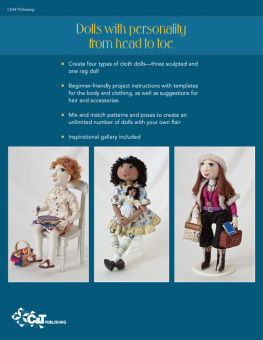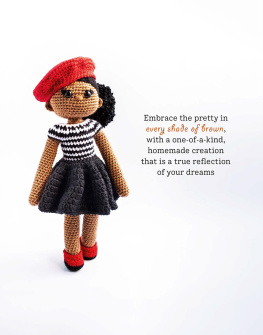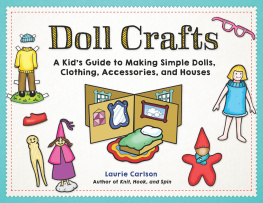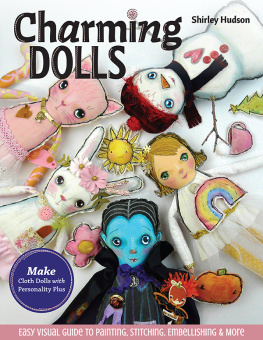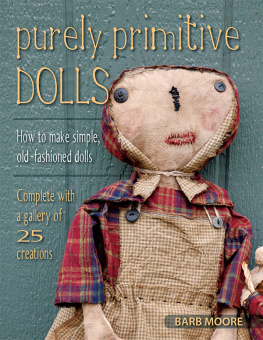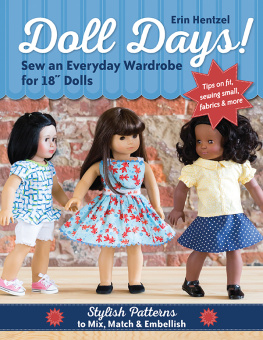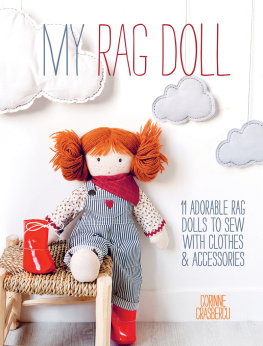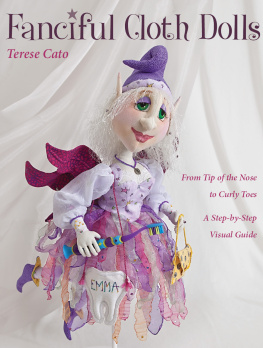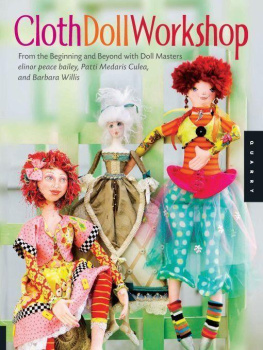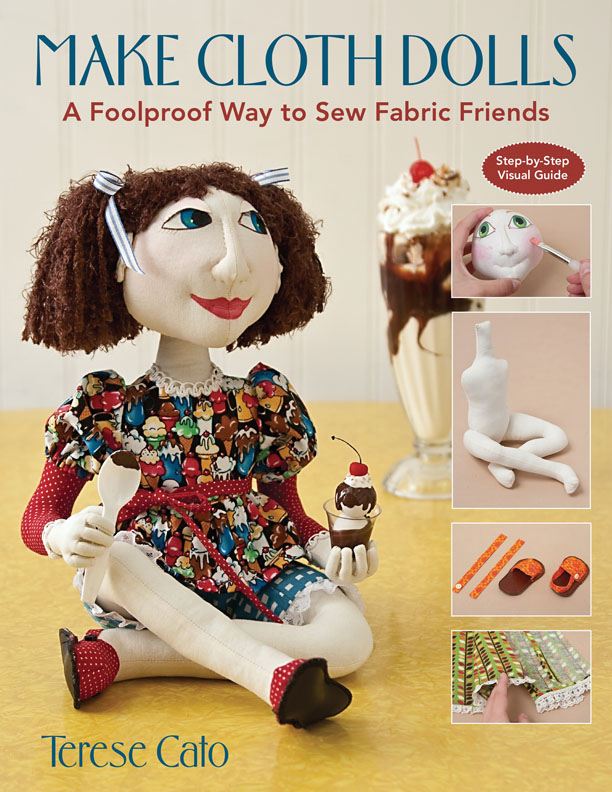
Text copyright 2010 by Terese Cato
Artwork copyright 2010 by C&T Publishing, Inc.
PUBLISHER: Amy Marson
CREATIVE DIRECTOR: Gailen Runge
ACQUISITIONS EDITOR: Susanne Woods
EDITOR: Liz Aneloski
TECHNICAL EDITOR: Ann Haley
COPYEDITOR/PROOFREADER: Wordfirm Inc.
COVER DESIGNER: Kristy Zacharias
BOOK DESIGNER: Rose Sheifer-Wright
PRODUCTION COORDINATOR: Kirstie L. Pettersen
PRODUCTION EDITOR: Julia Cianci
ILLUSTRATOR: Mary Flynn
Photography by Christina Carty-Francis and Diane Pedersen of C&T Publishing, Inc., unless otherwise noted
Published by C&T Publishing, Inc., P.O. Box 1456, Lafayette, CA 94549
All rights reserved. No part of this work covered by the copyright hereon may be used in any form or reproduced by any meansgraphic, electronic, or mechanical, including photocopying, recording, taping, or information storage and retrieval systemswithout written permission from the publisher. The copyrights on individual artworks are retained by the artists as noted in Make Cloth Dolls. These designs may be used to make items only for personal use or donation to nonprofit groups for sale. Each piece of finished merchandise for sale must carry a conspicuous label with the following information: Designs copyright 2010 by Terese Cato from the book Make Cloth Dolls from C&T Publishing, Inc.
Attention Copy Shops: Please note the following exceptionpublisher and author give permission to photocopy for personal use only.
Attention Teachers: C&T Publishing, Inc., encourages you to use this book as a text for teaching. Contact us at 800-284-1114 or www.ctpub.com for lesson plans and information about the C&T Creative Troupe.
We take great care to ensure that the information included in our products is accurate and presented in good faith, but no warranty is provided nor are results guaranteed. Having no control over the choices of materials or procedures used, neither the author nor C&T Publishing, Inc., shall have any liability to any person or entity with respect to any loss or damage caused directly or indirectly by the information contained in this book. For your convenience, we post an up-to-date listing of corrections on our website (www.ctpub.com). If a correction is not already noted, please contact our customer service department at ctinfo@ctpub.com or at P.O. Box 1456, Lafayette, CA 94549.
Trademark () and registered trademark () names are used throughout this book. Rather than use the symbols with every occurrence of a trademark or registered trademark name, we are using the names only in the editorial fashion and to the benefit of the owner, with no intention of infringement.
Library of Congress Cataloging-in-Publication Data
Cato, Terese.
Make cloth dolls : a foolproof way to sew fabric friends / Terese Cato.
p. cm.
ISBN 978-1-57120-962-7 (soft cover)
1. Dollmaking. 2. Soft toy making--Patterns. I. Title.
TT175.C393 2010
745.5924--dc22
2010001672
Printed in China
10 9 8 7 6 5 4 3 2 1
Dedication
In memory of Aunt Marie
Acknowledgments
I would like to thank C&T Publishing for allowing me the opportunity to reach beyond the students in my workshops and share my love for sewing. Being able to teach something that you love is truly a blessing.
Thank you to my husband for his patience and understanding. His unending support means everything to me.
CONTENTS
Preface
When I teach a doll workshop, I encourage the participants to make choices that appeal to them and let their dolls evolve. Most people begin by saying that they want their doll to look exactly like the project doll. Then funny things start to happen. They choose the fabrics that they like. The younger a person is, the younger his or her doll appears to be, and the older the person is, the older the doll appears to be. No two faces look alike, and none of them are a carbon copy of the project doll. By the time people get to the hairstyle, they find themselves wanting it to be different from the project dolls because another choice of hairstyle just seems to fit better. By the end of the class, there are no two dolls that look the same. They may have the same body and use the same pattern for the clothes, but that is where the similarities end. What is funniest to me is how the doll starts to resemble the doll maker in some way. The best part is hearing how everyone enjoyed the process so much, and hearing people begin to talk about how theyre going to make the next doll.
Let your own creativity take over. Take your time to learn the basic body construction. When the body is done it is a blank canvas ready for your own creative ideas. Sometimes when I start a doll, I have a complete, finished picture of her in my head. I know exactly where Im going, and it just flows right out. Then there are times when I think I know where Im going, but the doll just demands that I make changes to my original plan. Either way, Im always happy with the end result. If you have a sewing machine with a bunch of fancy stitches that youve never tried, now is your chance. Use coordinating threads to stitch on the edges of sleeves, skirts, pants, apronsanywhere you see a place to add some detail.
Just remember that there are no mistakes, just happy accidents. If you want to put sandals on your doll to show off her beautifully sculpted and painted toes, but her feet turn out to be less than you expected, put closed shoes on her instead. There is only one doll on whose face I intentionally put a mole. All the other moles were placed there to cover up a slip with the pencil.
I remember the first time I took my husband to an art and craft show. He is a mans manall about sports. He has taken on the difficult task of teaching me the rules of all the games. I have shown him the work and love that go into handmade items. As we were driving to the show, he asked me what we were going to buy. I explained that if something spoke to me then I would buy it. As only a wife can read her husbands face, I knew he was thinking, Oh boy! This is going to be a great afternoon. As we walked around, he began to comment on the amount of time and work that some of these people obviously put into their craft. Then it came. The moment something spoke to me. An artist who was a welder by trade created beautiful home dcor and accentsin this case, an old-fashioned sled with iron runners that came up the front and turned into geese. It was tall enough to use as a bench or coffee table, and I began to examine it closely as I tried to envision where Id place it in our home. As my husband watched me, he asked if it was speaking to me. He then began to examine it more closely himself and announced that he thought it might be speaking to him also. The sled is proudly displayed in our foyer and is quite a conversation piece.
I often hear that my dolls speak to people. The dolls tell a story or have an attitude that draws people to them. Sometimes a doll reminds them of someone they know or even of themselves. The details stand out and show the care and time that were taken to create this character. If the doll makes people smile or laugh, then they know they have to have one.
There is a wonderful feeling of satisfaction that comes when you complete your first doll and sit back to just look at it. Take your time in adding the detail that will bring your character alive. The look on her face, the position of the body, the fabric choices for the outfit, and the props will all come together to help tell her story without explanation. Use these elements to give your doll a personality and an attitude. When you are all done and sitting back to admire your handiwork, she will tell you what her name is. Name your doll, and then you can fill in the blanks to tell the rest of her story.

